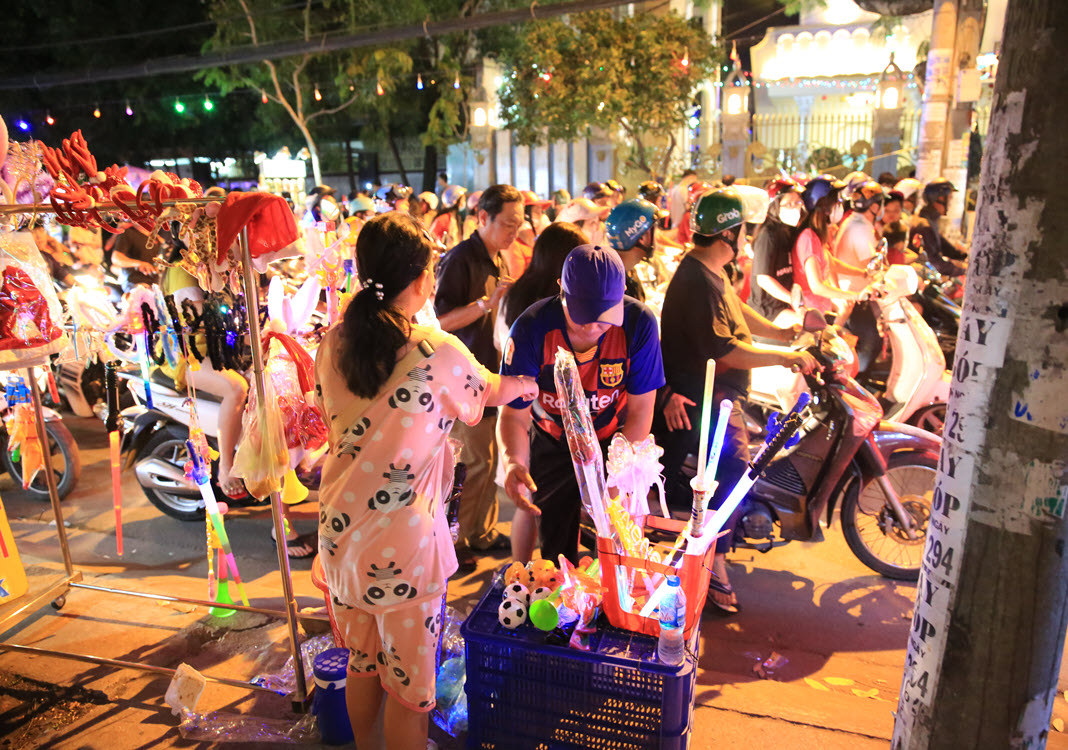About to come to a decision, the HCMC government is poised to adopt a new thinking on how the sidewalk and roadways can be used aside from being for traffic. The sidewalk and roadways can be utilized for other purposes, say officials. However, users have to be licensed and pay fees.
Poor management of the sidewalk and some roadways in HCMC has been a chronic problem unsolved for decades. Despite the tremendous efforts expended by the authorities, urban order on the sidewalk was temporarily restored only to become chaotic again. Urban management in this regard needs new thinking and new measures.
Urban order in disorder
Roughly four years ago, a massive campaign was waged to reestablish urban order on the sidewalk and roadways of this city. It was really effective in many areas when the relevant local authorities were determined to restore order using forceful measures, including the demolition of existing structures in violation of the rules, which had been rarely seen previously.
However, illegal occupation of the sidewalk and even some roadways is incredibly tenacious. As soon as authorities become weary, it will resurface.
In HCMC, after social distancing measures against Covid-19 were lifted in late April, the situation has become worse again. Many street sections, if not all, are occupied to be used as parking lots, eateries or makeshift markets.
Talking to Nguoi Lao Dong newspaper last week, Nguyen Ngoc Tuong, vice head of the HCMC Traffic Safety Board, said of the 157 streets which had been registered by local authorities as “model streets” in urban order, only a fifth could do so.
Licenses and fees
During a meeting convened by the HCMC Fatherland Front Committee to gather feedback about a decision draft on the management and temporary use of the sidewalk and roadways in the city, participants pinpointed existing problems and discussed measures for making the decision workable, reported Nguoi Lao Dong.
According to Ngo Hai Duong, head of the Section for Overland Infrastructure Management under the municipal Department of Transport, the draft includes key points regarding safety for pedestrians on the sidewalk. It also deals with technology applications to the management of and regulations on temporary use of some roadways and the sidewalk. New forms of management are also recommended, such as public participation in management, leasing and fee collection, among others.
However, Duong cautioned that if part of the sidewalk or roadways are used, the remaining part must be sufficient for walkers. All activities related to the sidewalk or roadways must be licensed, insisted Duong.
Another speaker, Dr. Trinh Van Chinh from the HCMC University of Transport, said it is essential to introduce clear regulations on the management of the sidewalk and roadways and assign concrete tasks to different authorities to avoid overlapping. Chinh suggested licenses should be awarded to traders and hawkers to regulate their areas and work time. Such stipulations will help hawkers feel assured and be more responsible, he said.
Licensing must be under strict control
Lawyer Nguyen Van Hau, vice chairman of the HCMC Association of Jurists, warned that the universal permission of the use of the sidewalk and roadways, albeit temporary, may lead to indiscriminate licensing regardless of users, locations or specific purposes. Hau argued that in accordance with the effective rules regarding this issue, not every authority is vested with the right to award a license. To keep the licensing on the right track, it is necessary to make it crystal-clear. Fee collection must be put under strict control and personal responsibility and accountability of the authorities concerned must be fully assumed.
Hau also mentioned a grim reality in the current management of the sidewalk where some local authorities are acting as “pimps” who illegally take money from people in return for their use of the sidewalk or roadways. These officials must be handled strictly, said Hau.

New thinking
Officials from the HCMC Department of Transport which helped draw up the decision draft present at the meeting listened carefully to participants’ opinions.
Tran Quang Lam, director of the HCMC Department of Transport, told Nguoi Lao Dong that during the compiling process, his department took into account every factor to make it suitable to practicality, particularly the feasibility and the minimization of adverse effects on local people.
Lam affirmed that opinion polls were conducted to collect thoughts from related people and households. Most of them gave their consent for the decision draft and said they are ready to comply with it. According to Lam, district governments will be authorized to award licenses.
In response to suggestions that the role of lower authorities—at the ward level—should be increased. Such opinion will be scrutinized and included in the draft, said Lam.
“The key point of the draft of the new decision on the management and temporary use of the sidewalk and roadways relates to the reaffirmation that the sidewalk is principally for pedestrian use no matter whether other functions are accepted for not,” said Lam. “For instance, functions which are not relevant to traffic. If they [the functions] are appropriate, our department will help the municipal government issue regulations on the streets available for them.”









